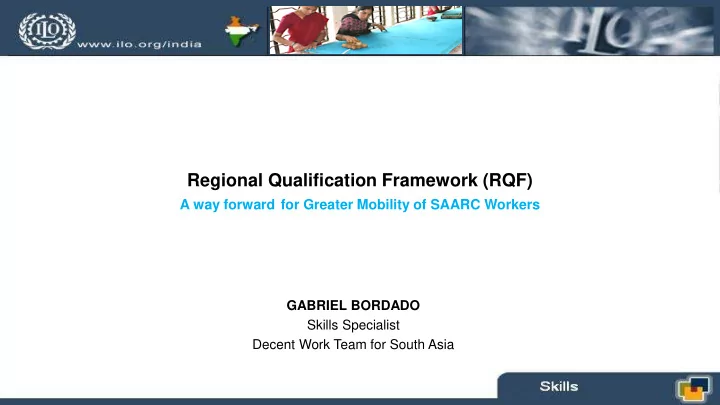

Regional Qualification Framework (RQF) A way forward for Greater Mobility of SAARC Workers GABRIEL BORDADO Skills Specialist Decent Work Team for South Asia
The Context…. 2030 Agenda – “Leave no one behind”
Basis to develop one for SAARC Kathmandu Declaration (November 2014) “ Education 17. The Heads of State or Government expressed their resolve to eliminating illiteracy from the region in line with the global goal of education for all and ensuring quality education in all institutions by reforming curricula, teaching methods and evaluation systems adequately supported by physical, technical and other facilities. The leaders agreed to promote regional cooperation in the field of vocational education and training. They directed their Education Ministers to develop a Regional Strategy for Enhancing the Quality of Education in order to raise the standards of South Asian educational institutions in order to better serve the youth in the region. …”
Basis to develop one for SAARC In May 2016, SAARC Action Plan on Labour Migration was developed to include….. 1.Development of a Framework for Skills Qualification 1.1.Developing a South Asian qualification reference framework and competency standards would facilitate harmonization of skills qualification at the regional level and also facilitate enhanced recognition of skills of migrant workers from South Asia in the destination countries. 1.2 Carry out mapping and review of existing qualifications frameworks, occupational standards and competency levels in South Asia and also that of major destination countries to support the development of relevant regional standards in priority trades for migrant workers from the region. 1.3 Member States would work towards recognition of their skills/qualifications by the destination countries. At the same time, they should strive towards arriving at a regional skills qualification framework which could be used as a reference for bilateral agreements, wherever possible, with destination countries or at regional and international consultative fora.
Some infographics on SAARC Migrant workers Each country categorizes skills level differently, therefore it is difficult to draw comparisons across countries
What is a Qualification Framework Is an instrument for the development, classification and recognition competencies (Knowledge, Skills, and Attitudes -KSA) along an agreed sets of levels Basis for structuring existing and new qualifications Indicates the comparability of different qualifications and its progression
What are RQF expected to deliver? Improved understanding of education system Increased coherence and coordination Increased access, transfer and progression Greater recognition of skills and learning Increased mobility of learners and workers International recognition and alignment of qualifications Enhanced opportunities for lifelong learning Improved employability of workers, productivity of enterprises and inclusive economic growth
Existing Regional Frameworks European Union - EQF Association of South East Asian Nations - AQRF Caribbean Community - CARICOMQF Southern African Development Community - SADCQF Gulf Cooperation Council - GCCQF Commonwealth of Learning – Transnational Qualifications Framework (TNQF) for small island states
Next steps Determine the status of NQF in the member states ? Describe and analyse frameworks, responsible bodies, agents, their interests, weaknesses, and strengths. What kind of developmental activities are still needed Development of the RQF How will RQF look like ? EQF ? Governance structure Code of practice to maintain commitment to the framework Quality Assurance system Advocacy Plan M&E mechanism
New Definition of education ..
SAARC Vision by 2030
In closing, ILO is committed to support this initiative through its vision of Decent Work for All
Recommend
More recommend